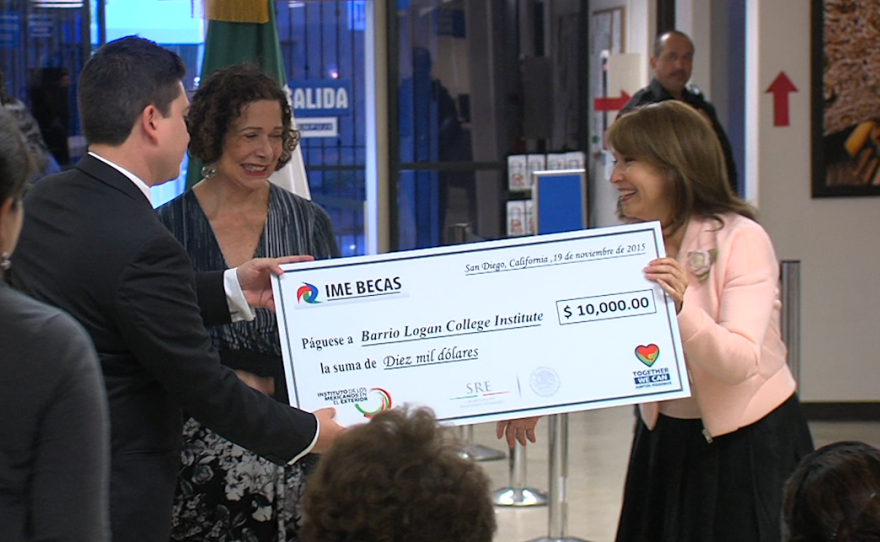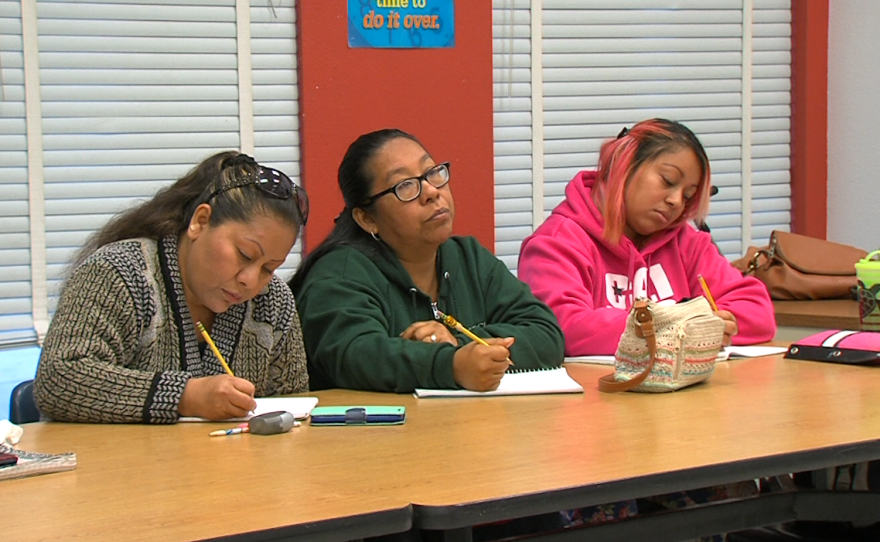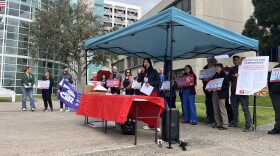Students at Monroe Clark Middle School in City Heights rattle through multiplication tables. They're attentive, eager to participate — not what you might expect from a middle school classroom.
That's because these students are the parents and grandparents of children attending Monroe Clark. They come to the campus twice a week to learn math and practice their reading and writing.
The program is called Plaza Comunitaria and it helps adults who immigrated to the United States, or who remain in small towns throughout Mexico, pick up their educations where they left off.
"I'm from Mexico City. It is a huge city and we have access to education, and the university is free for most of us," said Rocio Agiss, who heads the Plaza program in City Heights. "But there are many small communities that are far away from the cities. And at the time (the parents) were growing up, they didn't have access to public lights or telephones, and the schools were created by the residents.
"The teachers were not well prepared to teach (beyond elementary school), so (students) needed either to walk a long distance to get to the middle school or to stay there in the community and work."
Parents in the program can earn certificates from the Mexican government showing they've completed the equivalent of elementary and junior high schools. They can also get their GED and learn English through the program.
But Agiss said it goes beyond credentials.
"Our final goal is to help families to help their students to go on to college and graduate and have a successful life," Agiss said.
She jokes, but that's exactly what happened for Sofia Herrera.
"My kids don't like it that much because I fix their homework now," Herrera said through an interpreter. "But, no, they're very happy."
Herrera said she urges her daughters to put down their calculators and do their math on paper; it's what has helped her in class.
Herrera grew up in a small town in the Mexican state of Puebla. Her family spoke Náhuatl, an indigenous Aztec language that more than a million people still speak in central and eastern Mexico, so she only knows Spanish by ear and didn't learn how to write.
Herrera said when she took a job as a housekeeper in the United States, she avoided situations where she might have to write.
Plaza changed that.
"I still lack on grammar skills, but I can write letters to my parents and at least I feel more capable now," said Herrera, whose parents still live in Puebla.
Maria de los Remedios Gómez Arnau is the Mexican consul general in San Diego and provided the funds to bring Plaza Comunitaria to City Heights in 2007 after Monroe Clark parents asked for it. She said the program has another goal: to help Mexican immigrants learn English.
"Pedagogically, the teachers are saying that if an adult never was taught a foreign language, they should (strengthen) their own native language before really being able to learn the foreign language," Remedios Gómez Arnau said.
A basic understanding of grammar in one's own tongue makes it easier to learn a new language, Remedios Gómez Arnau said.

Recently the consulate hosted a ceremony, passing out giant novelty checks to immigrant students going on to college and to other adult education programs in the San Diego region. The consul said her office has awarded more than $500,000 to about 1,300 students.
"I think it's important that the community at large in the United States understand that the Mexican government is committed to help the Mexican communities, because we know that that will be positive for the United States and for Mexico, too," Remedios Gómez Arnau said.
For Plaza student Rosa Loredo the program has had a profound effect on her sense of self.
She moved to the United States in 1992 from a ranchito, or small town, in the Sinaloa state of Mexico to work in onion fields and apple orchards. She needed more money to support her three children.
Loredo laments not being able to go past fourth grade, which is all that was offered close to home.
"I liked school very much," Loredo said through an interpreter. "I wanted to be something more, but the economy didn't give me the chance to do that."
She found out about the program because her grandchildren go to Monroe Clark and said it has reignited her drive to become "something more."
"I have high hopes and, I don't know, I'm happier. I'm less introverted, more talkative," Loredo said. "It's something I wasn't expecting. It's like my mind opened up."
Both Loredo and Herrera said they'd like to become nurses.
"As long as there's life, there's hope," Loredo said. "It's never too late to study."








